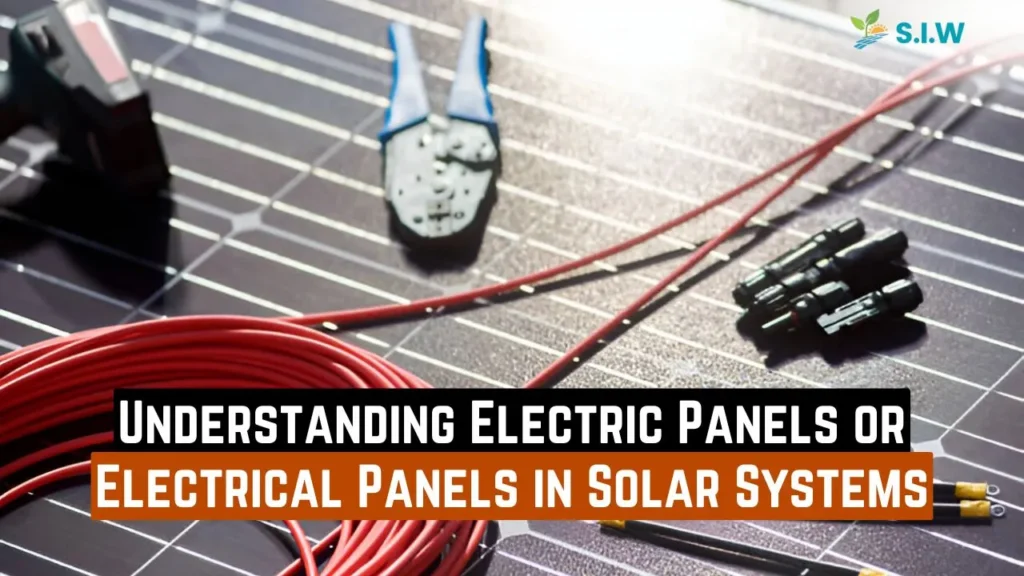Electric panels, often referred to as electrical panels or breaker panels, play a pivotal role in the efficient functioning of solar systems. Understanding these components is essential for anyone looking to harness solar energy effectively. This article delves into the intricacies of electric panels within solar systems, highlighting their function, types, installation, maintenance, and common issues.
What is an Electric Panel?
An electric panel is a crucial part of a solar system, serving as the central point where the electricity generated by solar panels is distributed to various circuits in a building. It is designed to manage the flow of electricity, ensuring that power is safely and efficiently routed to where it is needed. In solar systems, electric panels convert the direct current (DC) produced by solar panels into alternating current (AC), which is the standard form of electricity used in homes and businesses.
Types of Electric Panels in Solar Systems
1. Main Breaker Panels
Main breaker panels are the most common type found in residential solar systems. They serve as the primary point of distribution for all electrical circuits in the home. This panel includes a main circuit breaker that can shut off power to the entire system, providing an essential safety feature.
2. Subpanels
Subpanels are smaller electric panels that serve specific areas or functions within a home. In solar systems, subpanels can be used to manage the power supply to additional circuits, such as a garage or workshop, allowing for better distribution of energy generated from solar panels.
3. Smart Panels
Smart panels are an advanced type of electric panel that offers enhanced functionality and control. These panels come equipped with technology that allows homeowners to monitor their energy usage in real time, providing insights into consumption patterns. They can also integrate with home automation systems, allowing for greater efficiency and convenience.
The Role of Electric Panels in Solar Energy Systems
Electric panels serve several critical functions in solar energy systems:
1. Power Distribution
Electric panels ensure that the electricity generated from solar panels is efficiently distributed to various circuits in the home. This distribution is crucial for maintaining the flow of energy to essential appliances and devices.
2. Safety Mechanism
Electric panels are equipped with circuit breakers that protect the electrical system from overloads and short circuits. These safety mechanisms prevent potential fire hazards and equipment damage by automatically shutting off power when necessary.
3. Conversion of DC to AC
Solar panels produce direct current (DC) electricity, which is not suitable for most household applications. Electric panels, in conjunction with inverters, convert this DC electricity into alternating current (AC), making it usable for household appliances.
Installation of Electric Panels in Solar Systems
1. Location and Sizing
The location of an electric panel is crucial for the effective operation of a solar system. It should be easily accessible for maintenance and monitoring. Proper sizing is also essential to ensure that the panel can handle the load of the electrical system.
2. Professional Installation
While DIY installations may seem tempting, electric panels should be installed by qualified electricians. This ensures compliance with local building codes and safety standards, reducing the risk of electrical hazards.
3. Integration with Inverters
During installation, it is important to integrate the electric panel with the solar inverter properly. The inverter converts DC electricity into AC, and the electric panel manages this AC electricity, directing it to the appropriate circuits. Proper integration ensures efficient energy flow and system reliability.
Maintenance of Electric Panels
1. Regular Inspections
Regular inspections of electric panels are essential to ensure their proper functioning. Homeowners should check for any signs of damage, corrosion, or overheating. Any issues should be addressed immediately to prevent further damage or safety hazards.
2. Cleaning
Dust and debris can accumulate on electric panels, which can hinder their performance. Cleaning the panels regularly helps maintain optimal efficiency. However, care must be taken to turn off the power before attempting any cleaning.
3. Professional Servicing
It is advisable to have electric panels professionally serviced at least once a year. A qualified electrician can identify potential issues, perform necessary repairs, and ensure that the panel is functioning safely and efficiently.
Common Issues with Electric Panels in Solar Systems
1. Overloading
Overloading occurs when the electric panel is tasked with handling more power than it is designed for. This can lead to circuit breakers tripping frequently and can cause damage to the electrical system. Proper sizing of the electric panel and regular monitoring can help prevent overloading.
2. Aging Components
Like all electrical components, electric panels can degrade over time. Aging components can lead to inefficiencies and safety hazards. Regular inspections can help identify aging parts that need replacement.
3. Corrosion and Moisture Damage
Electric panels are susceptible to corrosion, especially in humid or wet environments. Moisture can cause electrical shorts and other significant issues. Ensuring that the panel is installed in a dry location and regularly inspected can mitigate this risk.
The Future of Electric Panels in Solar Systems
As solar technology continues to evolve, electric panels are becoming smarter and more efficient. Innovations such as enhanced energy management systems and integration with smart home technologies are making electric panels more user-friendly and efficient. Homeowners are increasingly looking for solutions that not only manage energy distribution but also provide insights into energy consumption and savings.
In The End
Understanding electric panels in solar systems is essential for maximizing the benefits of solar energy. These components play a critical role in managing electricity flow, ensuring safety, and converting solar energy into a usable form. By choosing the right type of electric panel, ensuring proper installation, and maintaining the system, homeowners can enjoy the full advantages of solar energy while minimizing risks. As technology advances, electric panels will continue to evolve, providing even more efficient and intelligent solutions for energy management.








